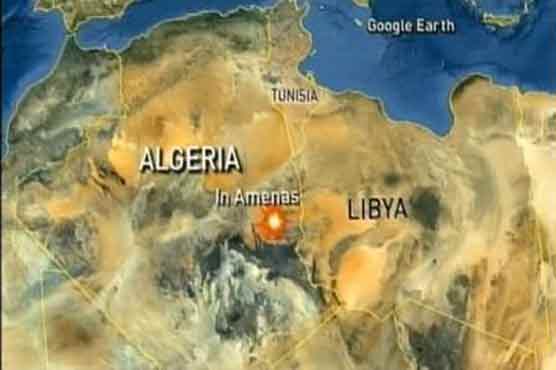19 hostages, 29 militants dead in Algeria

None of the hostages or militants remained alive after final assault by Algerian forces.
AIN AMENAS: Algerian special forces stormed a natural gas complex in the middle of the Sahara desert on Saturday in a "final assault" that ended a four-day-old hostage crisis, according to the state news agency and two foreign governments.
At least 19 hostages and 29 Islamist militants have been killed.
The report, quoting a security source, didn t say whether any hostages or militants remained alive, and it didn t give the nationalities of the dead.
It said the army was forced to intervene after a fire broke out in the plant and said the militants killed the hostages. It wasn t immediately possible to verify who killed the captives.
Seven hostages and 11 militants were killed in Saturday s operation, adding to the previous tally of 12 captives and 18 kidnappers.
The Ain Amenas plant is jointly run by BP, Norway s Statoil and Algeria s state-owned oil company. The governments of Norway and Britain said they received confirmation the siege was over.
The entire refinery was mined with explosives and set to blow up, the Algerian state oil company Sonatrach said in a statement, adding that the process of clearing the explosives had begun. The Algerian media reported that the militants had planned to blow up the complex.
The siege transfixed the world after radical Islamists linked to al-Qaida stormed the complex, which contained hundreds of plant workers from all over the world.
Algeria s response to the crisis was typical of the country s history in confronting terrorists military action over negotiation and caused an international outcry from countries worried about their citizens.
Algerian military forces twice assaulted the areas where the hostages were being held with minimal apparent negotiation first on Thursday and then on Saturday.
The latest deaths bring the official Algerian tally of dead to 19 hostages and 29 militants, although reports on the number of dead, injured and freed have been contradictory throughout the crisis. Militants originally said they had seized 41 foreign hostages.
The al-Qaida-linked militants attacked the plant Wednesday morning. They crept across the border from Libya, 60 miles (100 kilometers) away, and fell on a pair of buses taking foreign workers to the airport.
The buses military escort drove off the attackers in a blaze of gunfire that sent bullets zinging over the heads of crouching workers. A Briton and an Algerian probably a security guard were killed.
Frustrated, the militants turned to the vast gas complex, divided between the workers living quarters and the refinery itself, and seized hostages, the Algerian government said. The gas flowing to the site was cut off.
On Thursday, Algerian helicopters opened fire on a convoy carrying both kidnappers and their hostages, resulting in many deaths, according to witnesses.
In their final communications, the militants said they were holding seven hostages: three Belgian, two Americans, a Japanese and a Briton.
They had threatened to kill them if the Algerian army attacked.
Algerian authorities estimated that about 30 militants occupied the Ain Amenas site Wednesday and with 18 already reported dead, it appeared Saturday that the hostage crisis was finally over.
The standoff has put the spotlight on al-Qaida-linked groups that roam remote areas of the Sahara, threatening vital infrastructure and energy interests. The militants initially said their operation was intended to stop a French attack on Islamist militants in neighboring Mali though they later said it was two months in the planning, long before the French intervention.
The accounts of hostages who escaped the complex highlight the cavalier attitude toward their lives taken by both kidnappers and the military.
Ruben Andrada, 49, a Filipino civil engineer who works as one of the project management staff for the Japanese company JGC Corp., described how Algerian helicopter gunships had earlier opened fire on vehicles carrying hostages and the gunmen who used them as shields.
On Thursday, about 35 hostages guarded by 15 militants were loaded into seven SUVs in a convoy to move them from the housing complex to the refinery, Andrada said. The militants placed "an explosive cord" around their necks and were told it would detonate if they tried to run away, he said.
"When we left the compound, there was shooting all around," Andrada said, describing the helicopters attack. "I closed my eyes. We were going around in the desert. To me, I left it all to fate."


